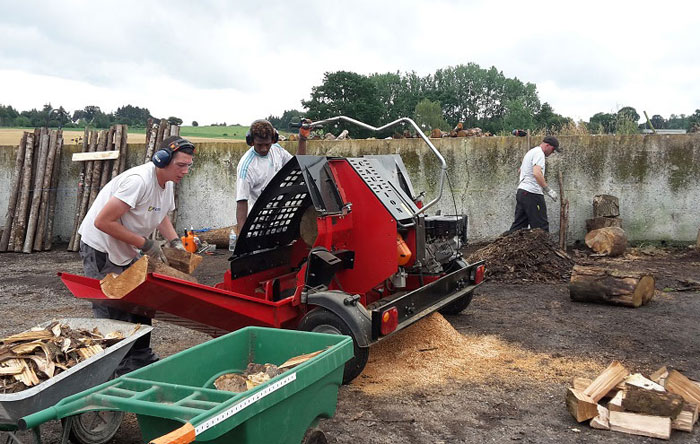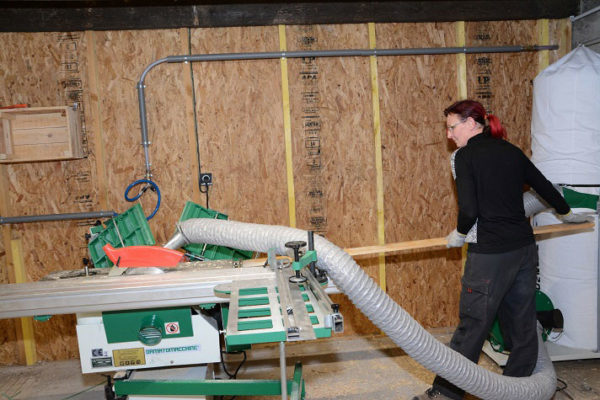“Zero Long-Term Unemployment Zones” Experiment in France: Work as a Common Good

For 1 May, International Workers’ Day, ATD Fourth World is highlighting the informal, often unrecognized, work of people living in poverty. Because they are not part of the traditional world of work, people in poverty are often unrepresented by labor groups. However, people who live in poverty frequently have job-related expertise that goes unnoticed. These capabilities allow them to earn money and develop support networks.
Launched in 2017 by ATD Fourth World, the “zero long-term unemployment zones” experiment has already created 800 jobs in France. It has also helped 11 companies looking to recruit new employees. The idea is to offer a job opportunity to anyone who has been unemployed for at least a year.
Basic principles
The “zero long-term unemployment zones” concept starts with three principles:
- No one is unemployable.
- Even people who have been out of work for a long time have job related know-how.
- There are plenty of jobs because society has many unmet needs.
Money isn’t the issue. Every year the community already pays for the many expenses (monetary and personal) and shortfalls that long-term unemployment creates. Estimates put the cost of long-term unemployment to the nation, including social costs, at 43 billion EUR. This comes to at least 18,000 EUR per year for each person without a long-term job. Jobs in the program are created on a permanent contract and paid at the legal minimum wage. Funding comes from redirecting government subsidies for the unemployed. The program participants’ work benefits the employer, and also helps the local communities in terms of income generated and taxes paid.
“With a permanent contract, you can do what you want”
“My job was cleaning houses. I never thought I’d be involved in furniture design.”
Valérie Garcia has come a long way. Two years ago, she found a job at TEZEA, one of the employment companies that “zero long-term unemployment zones” has created. Ms. Garcia has just bought a new car. “With a permanent contract, you can do what you want”, she says.

Hers is not the only story. In the French communities of Pipriac and Saint-Ganton, elected officials and employees are proud of what “zero long-term unemployment zones” has achieved in their community.
“It’s just that here we don’t need to have job interviews”, says Christelle Lascaux, a TEZEA employee. Since June 2018, Ms. Lascaux has found a job, and also a little self-confidence.
“I act like a clown here all the time. I cheer up my colleagues and I’m always happy.”
For four years, Ms. Lascaux had trouble finding a stable job. “When you lose your job and you no longer have a salary”, she explains, “you tell yourself that you’re useless, that you’re nothing. I was withdrawn. I kept to myself. But that wasn’t who I am. I need to see people, to talk to people, to work.”
Maxime Marchand found her place after months of unemployment. Previously, she had worked as bricklayer and stonemason. “That was my job and I liked it”, she said. “But because of health problems, I had to stop working as a mason. And then I couldn’t get my driver’s license because of my illness. So I couldn’t find a job.” For the past year, Ms. Marchand has been part of the TEZEA team. “We have a say in what we want here”, she explains. “The bosses are quite understanding. It’s not like we’re working non-stop in a big factory.” Now, thanks to this new job experience, her dream is to find employment that pays more than the minimum wage.
“Everyone has something to gain”
Philippe Louet is the Mayor of Saint-Ganton. “Of the 424 inhabitants here”, he says, “12 or 13 were initially long-term unemployed. They had virtually no social ties and stayed at home. Now, more than half of them work at TEZEA. In addition, they have a new attitude towards life. They go shopping and they meet up with each other. It’s a win-win situation for everyone.”
In Pipriac, Mayor Marcel Bouvier initially found the project “a little utopian”. However, “The city is benefiting from this experiment”, he says. “When nearly 70 people earn the minimum wage, this inevitably has an economic impact on the community. The number of people asking for help from the Community Centre for Social Action has decreased. So has the number of people visiting the Social and Solidarity Store.” Mayor Bouvier also states that he admires “the humanity of the project”.
The experiment continues
“We must not stop now”, says Didier Goubert, director of the socially conscious company WLT (Working and Learning Together). In addition to an economic assessment of the project, WLT’s leaders say it is important to evaluate the project from a social perspective too. “We must study its impact on the health of the inhabitants, on the educational success of children, on the cohesion of the community, and on participation in elections”, explains Claire Hédon, President of ATD Fourth World in France.
In addition to Pipriac and Saint-Ganton, eight other communities will be experimenting with “zero long-term unemployment zones” between now and 2021. A few months ago, the President of the French Republic announced that the country is planning to enlarge the experiment. Currently, more than a hundred communities have applied to embark on this hopeful adventure.
Interview in the ATD Fourth World newspaper from April 2019 (content in French)

